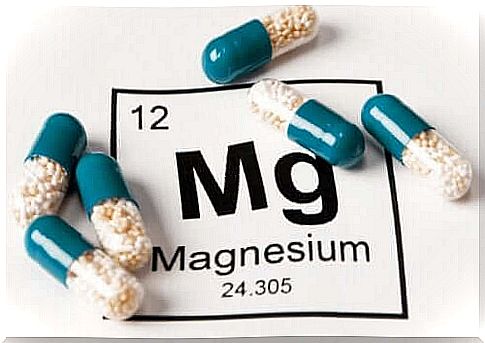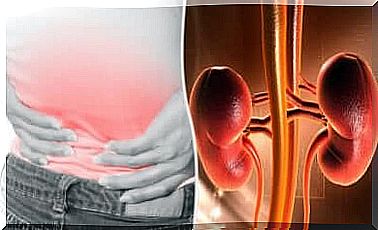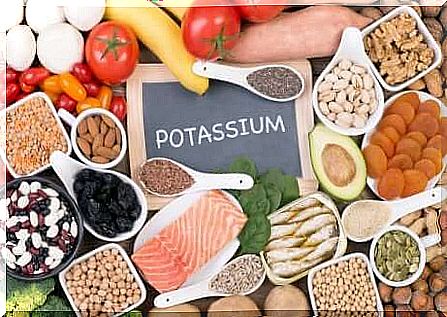Hypomagnesemia: Low Levels Of Magnesium In The Blood
Hypomagnesemia is the presence of low levels of magnesium in the blood. In this article, we tell you more about its causes and treatment.

We speak of hypomagnesemia when the amount of magnesium in the blood is less than what is considered normal (between 1.7 md / dL and 2.2 mg / dL). Based on these figures, it is established that hypomagnesemia occurs when laboratory results are less than 1.7 mg / dL.
If you want to learn more about the causes and symptoms, this article is for you.
Magnesium in the body
The magnesium is a cation, ie, a component with a positive electric charge. Among the cations in the human body, it is the most abundant outside the cell. Within cells, it is the second most abundant cation (after potassium).
The majority of magnesium is found in bone tissue. 20% is found in the muscles, and the rest is distributed to the other organs.
The amount of magnesium in the body is regulated between food and elimination through urine. Thus, during a normal and varied diet, there are 360 milligrams of magnesium. This amount is sufficient to support the normal functioning of the body.
On the other hand, the foods that provide the most magnesium to the human body are grains, dried fruits and legumes. Magnesium is also found in green leafy vegetables, and seafood such as shellfish.
Causes of hypomagnesemia
Experts Joel Michels Topf and Patrick T. Murray cite four main causes of hypomagnesemia:
- Lower intake in the body. It is a rare and uncommon cause of this disorder. When magnesium ingestion decreases, the renal system has difficulty retaining it. This can occur in states of malnutrition or chronic alcoholism. Likewise, hypomagnesemia is a side effect in people who are fed parenterally (veins) and not orally.
- Major losses. If the digestive system is not able to retain and absorb the magnesium that comes in with food, then it triggers hypomagnesemia. The diarrhea, for example, can be a cause of reduced absorption.

- Hyperparathyroidism. As Helbert Rondon-Berrios perfectly explains , people who suffer from this pathology are affected by what is called “redistribution of magnesium”. When there is a deficiency of parathyroid hormone (hormone that increases calcium in the blood), the metabolism of magnesium is affected. It is then retained by the bones and is not present in the blood.
- Renal dysfunction. As the balance of magnesium depends on its renal excretion, in renal pathologies there may also be hypomagnesemia. This is because there is a genetic condition – known as Gitelman syndrome – in which children are born with impaired renal tubules that prevent them from retaining potassium, calcium and magnesium.
Symptoms of hypomagnesemia
In most cases, hypomagnesemia does not generate symptoms. The signs that become evident are generated by other associated substances. Therefore, the main trigger for symptoms is the lack of potassium which leads to hypomagnesemia.

Once the body is deficient in magnesium and potassium, calcium is likely to decrease as well. Therefore, hypocalcemia is added to the symptoms.
The specialist James L. Lewis details the following clinical picture:
- Nausea and vomiting.
- Weakness and fatigue.
- Anorexia: loss of appetite.
- Muscle tremors: These may be mild, such as muscle twitching or severe spasms.
- Tetanus symptoms: generated by extreme contracture of the muscles.
- Seizures: according to several studies from the University Hospital of Getafe, alterations in the internal blood environment can also modify the nerve transmission of neurons.
Treatment to follow
If the hypomagnesemia is mild and is only detected during routine analysis, treatment is straightforward. Initially, the indication will be a diet rich in magnesium. Then it is essential to look for the underlying cause.
If, despite the diet, there is no improvement in blood magnesium, then supplements prescribed by the doctor will be necessary. It is always best to administer the supplements orally.
On the other hand, the parenteral route of administration of magnesium is reserved for severe cases, with symptoms that affect quality of life.
However, patients who cannot use the oral route, due to digestive surgery for example, also opt for the parenteral route. This route is also generally recommended for chronic alcoholics suffering from hypomagnesemia.
If the hypomagnesemia is accompanied by a lack of potassium or calcium in the blood, they should also be treated. This is shown by this study published in the Journal of Clinical Rheumatology in 2008.
Indeed, the ideal is to provide a supplement for all substances. Because, if we improve only one value (potassium for example), without correcting the others, the effect will not be sustainable.
Fight hypomagnesemia
In the event of a diagnosis of low levels of magnesium in the blood, the doctor will indicate a suitable diet to follow as well as a specific treatment. The simple follow-up of these measures will normally make the deficiency disappear.
Finally, do not forget to maintain a healthy lifestyle and pay attention to any symptoms to prevent this type of problem in time.









